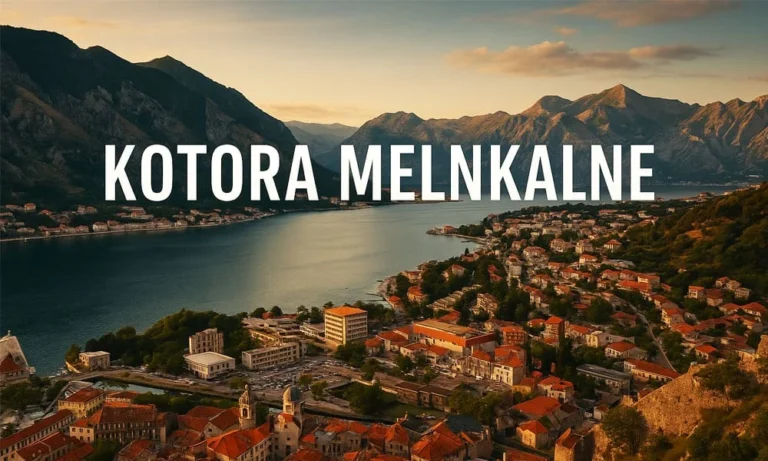Introduction:
The name Kotora Melnkalne is one that piques interest with its unique sound and mystery. While it may not be widely recognized in mainstream media or history, it carries a sense of wonder that drives curiosity. But what exactly does Kotora Melnkalne signify? Is it a part of a cultural tradition, a fictional creation, or perhaps a deeper symbol of something yet to be fully explored? In this article, we’ll take a deep dive into the possible origins and cultural impact of Melnkalne, uncovering its hidden layers.
Unraveling the Mystery: What is Kotora ?
At first glance, Kotora Melnkalne seems like an unusual combination of sounds—both complex and distinctive. Although the exact origin of the name remains elusive, it could potentially have linguistic or cultural ties to regions with deep-rooted histories. Names like these often hold more meaning than meets the eye, frequently carrying the weight of ancestry, mythology, or even a creative expression of identity.
Possible Linguistic Roots of Kotora
One possible explanation for the name’s structure is its roots in a language or dialect that isn’t immediately recognizable. Linguists often find that names, especially those with unusual syllabic patterns, may have ancient roots or connections to lost languages. These kinds of names might hint at lost cultures or forgotten histories, and Kotora could be one such example.
Melnkalne in Myth and Folklore
Names like Kotora Melnkalne are often linked to mythological tales or cultural folklore, especially in societies with a rich oral tradition. While no specific mythological story directly references this name, it’s possible that Kotora could be part of a forgotten mythos—perhaps a hero, a villain, or even a symbolic figure who plays a key role in the narratives passed down through generations.
A Symbolic Figure: Hero or Villain?
In many cultures, names are more than just identifiers—they’re symbols. The name Kotora Melnkalne could represent an archetypal figure in folklore—someone who represents balance, strength, or transformation. Heroes and villains alike often bear names that reflect their role in stories, whether they embody virtues or flaws. Perhaps Kotora Melnkalne was once a figure known for their mythical deeds, whose story faded with time but whose name still carries significance.
The Cultural Significance of Kotora Melnkalne
Cultural names can hold profound meaning, often representing identity, values, and social standing. Melnkalne, if rooted in a specific culture, may reflect a deeper understanding of that culture’s worldview. For example, names can indicate status, family lineage, or even the spiritual beliefs of a community.
Cultural Heritage and the Power of Names
Throughout history, names have been used to preserve cultural heritage. The name Kotora Melnkalne, with its distinctiveness, could potentially be a representation of a family’s heritage, a region’s legacy, or even a symbol of cultural pride. Understanding its origins would require knowledge of the specific cultural or linguistic traditions it may have come from.
Kotora Melnkalne and Its Role in Modern Society
Today, names like Kotora Melnkalne often transcend their historical or cultural roots and make an impact in various fields such as art, entertainment, and online spaces. In our interconnected world, a name can go viral, become part of a global discussion, or simply act as a memorable symbol of creativity.
Kotora Melnkalne in Pop Culture
As the world of pop culture continues to evolve, new names and terms continuously emerge. Kotora could very well be a name that makes waves on social media, through memes, or within niche internet communities. Names that resonate with people on a personal level often have a tendency to resurface in new forms, whether as part of a character in a book or even a user-created persona in online games.
The Psychological Impact of Names Like Kotora
Names carry weight. Psychologically, a name can shape perceptions, build identities, and even influence an individual’s life path. A name like Kotora could evoke curiosity, respect, or even awe. Whether it’s through its rare occurrence or the uniqueness of its syllables, people often form opinions or emotional connections based on names alone.
Why We Remember Certain Names
The human mind is wired to remember names that stand out. A name like Kotora Melnkalne, which combines both unusual and captivating elements, is more likely to linger in one’s memory. It’s not just the meaning but the emotional resonance that such names hold that makes them unforgettable.
Frequently Asked Questions (FAQs)
1. What is the origin of Kotora Melnkalne?
The exact origin of Kotora Melnkalne remains uncertain, but it is likely tied to a forgotten myth or a cultural tradition with deep roots. It may also be a name with linguistic significance from a lesser-known language.
2. Is Kotora Melnkalne a fictional character?
Though there’s no widely known fictional character by the name of Kotora Melnkalne, it is possible that this name has appeared in obscure stories, games, or fan fiction, making it an important part of fictional universes.
3. Why does Kotora Melnkalne sound so unique?
The uniqueness of the name Kotora comes from its combination of uncommon syllables. This can make it sound exotic or mysterious, which often piques interest and prompts exploration.
4. Can Kotora Melnkalne be a popular name in any specific culture?
While not widely recognized, names similar to Kotora may appear in cultures with less documented history or in creative expressions such as art or literature, potentially influencing modern naming trends.
Conclusion
The name Kotora Melnkalne is more than just a combination of sounds. It’s a name that evokes curiosity, suggesting deep cultural, linguistic, or fictional significance. Whether it’s tied to folklore, mythology, or modern-day pop culture, Kotora Melnkalne represents the richness of human creativity and the ongoing evolution of names in our global society. As we continue to explore its potential meanings, we’re reminded of how names hold power to shape stories, cultures, and identities.
